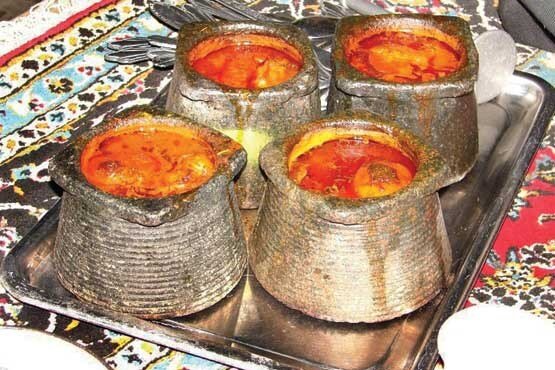Permanent sales exhibition of stone objects inaugurated in Mashhad

TEHRAN – A permanent sales exhibition, dedicated to objects and utensils, which are made from Harkareh stone blocks, opened its doors to the public on Sunday.
“The art of stone carving has always been one of the special and unique arts of Mashhad, and in this regard, the creativity and innovation of the local artists has led to the production of new art that combines several arts,” a local cultural official said, addressing the opening ceremony.
Harkareh stone utensils are amongst the popular traditional handicrafts in northeastern Iran, which are believed to have many medicinal and effective properties.
Despite the influx of Teflon and Pyrex utensils, some families still prefer to make broth or even some stews in these pots.
“Serpentine” stone with the local name of Harkareh, which means a pot that does everything, is taken from the southern mountains of Mashhad and is transferred to workshops to be turned into dining utensils, such as stone pots, bowls, glasses, decorative items, samovars, etc.
Harkareh is famous for its flexibility. Enjoying iron and magnesium ions in their structure, these dishes have many medicinal and effective properties against diseases such as anemia and osteoporosis.
In addition to reducing the amount of water in the food, these utensils provide the nutrients needed by the body by releasing the beneficial salts in the stone and gradually provide the food with the extra flavor it needs.
Stone utensils can be used to cook broth, stews, and other dishes, but they never cook rice or fry anything in them. With the help of a hatchet, they cut the unevenness of the stone and make a hole in it. After that, the desired inscriptions are etched on the container.
Iran exported $523 million worth of handicrafts during the calendar year 1398 (ended March 19, 2020). Of the figure, some $273 million worth of handicrafts were exported officially through customs, and about $250 million was earned via suitcase trade (allowed for customs-free and tax-free transfer) through various provinces, according to data provided by the Ministry of Cultural Heritage, Tourism and Handicrafts.
Ceramics, pottery vessels, handwoven cloths as well as personal ornamentations with precious and semi-precious gemstones are traditionally exported to Iraq, Afghanistan, Germany, the U.S., the UK, and other countries.
AFM/
Leave a Comment